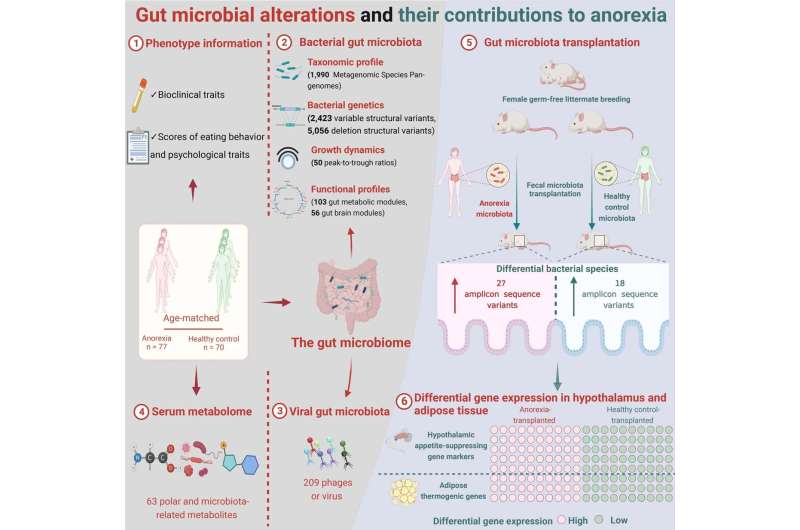April 21, 2023 report
This article has been reviewed according to Science X's editorial process and policies. Editors have highlighted the following attributes while ensuring the content's credibility:
fact-checked
peer-reviewed publication
trusted source
proofread
Delving into the disruptive gut microbiome of anorexia nervosa pathology

Published in Nature Microbiology, a study by researchers at the University of Copenhagen in Denmark has delved into the microbiota of patients with anorexia nervosa (AN) pathology and identifies the mechanistic interplay between restricted eating habits and how the gut microbiota's natural response negatively accentuates the pathology. Additionally, fecal microbiota transplantation from AN cases to germ-free mice under energy-restricted feeding mirrored AN eating behaviors.
A News & Views piece has been published in the same journal to outline the researchers' findings.
Anorexia has been heavily linked to various social and environmental factors, and altered gut microbiota has been observed in individuals with AN using amplicon sequencing in relatively small cohorts.
In the current study, "The gut microbiota contributes to the pathogenesis of anorexia nervosa in humans and mice," shotgun metagenomics was performed on fecal samples, and metabolomics was conducted with blood samples from a cohort of 77 women with AN and 70 women in a healthy control.
Women with AN were much leaner and had lower fasting serum concentrations of glucose and insulin, higher insulin sensitivity and lower blood serum C-reactive protein. Altered serum metabolite compounds were identified, which could indicate the compounds are operating via blood circulation, affecting brain regulation of appetite, emotions and behavior. Or the metabolites could be triggering gut-microbiota-brain neuronal signaling pathways.
In comparing stool samples, there was no significant difference in overall bacterial cell counts between AN and the healthy control. While cell counts and diversity were similar, there were marked differences in enriched or depleted bacterial taxa. Among the depleted species in AN were Roseburia intestinalis and Roseburia inulinivorans, species that have a high capacity for digesting plant polysaccharides and are considered part of a healthy gut microbiota.
Bacterial functional modules creating metabolite compounds associated with the degradation of neurotransmitters were enriched in AN, and various structural variants in bacteria were linked to metabolic features of AN.
The gut virome was also altered in the AN group, as researchers noted a reduction in viral–bacterial interactions. Where healthy gut viruses typically reduce the populations of certain bacteria, the decreased interactions allowed the proliferation of some bacterial species.
Mice on an energy-restricted diet were given fecal transplants. Those that received AN transplants initially lost even more weight and then took longer to regain weight compared with mice transplanted with stools from the healthy control group. The AN stool mice had higher expression of appetite suppressor genes in the brain's hypothalamus region and higher expression of thermogenesis-related genes in adipose tissue involved with energy regulation.
In a non-pathology scenario, the bacterial metabolites mediating some of the effects of hunger might be a good biological strategy, allowing energy to be concentrated on finding the next meal. In the case of anorexia, the survival strategy is accidentally aligned with a pathology that is taking advantage of the mediated space to further the pathological behavior.
More information: Yong Fan et al, The gut microbiota contributes to the pathogenesis of anorexia nervosa in humans and mice, Nature Microbiology (2023). DOI: 10.1038/s41564-023-01355-5
Tom Hildebrandt et al, The gut microbiome in anorexia nervosa, Nature Microbiology (2023). DOI: 10.1038/s41564-023-01372-4
© 2023 Science X Network





















